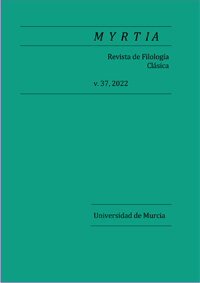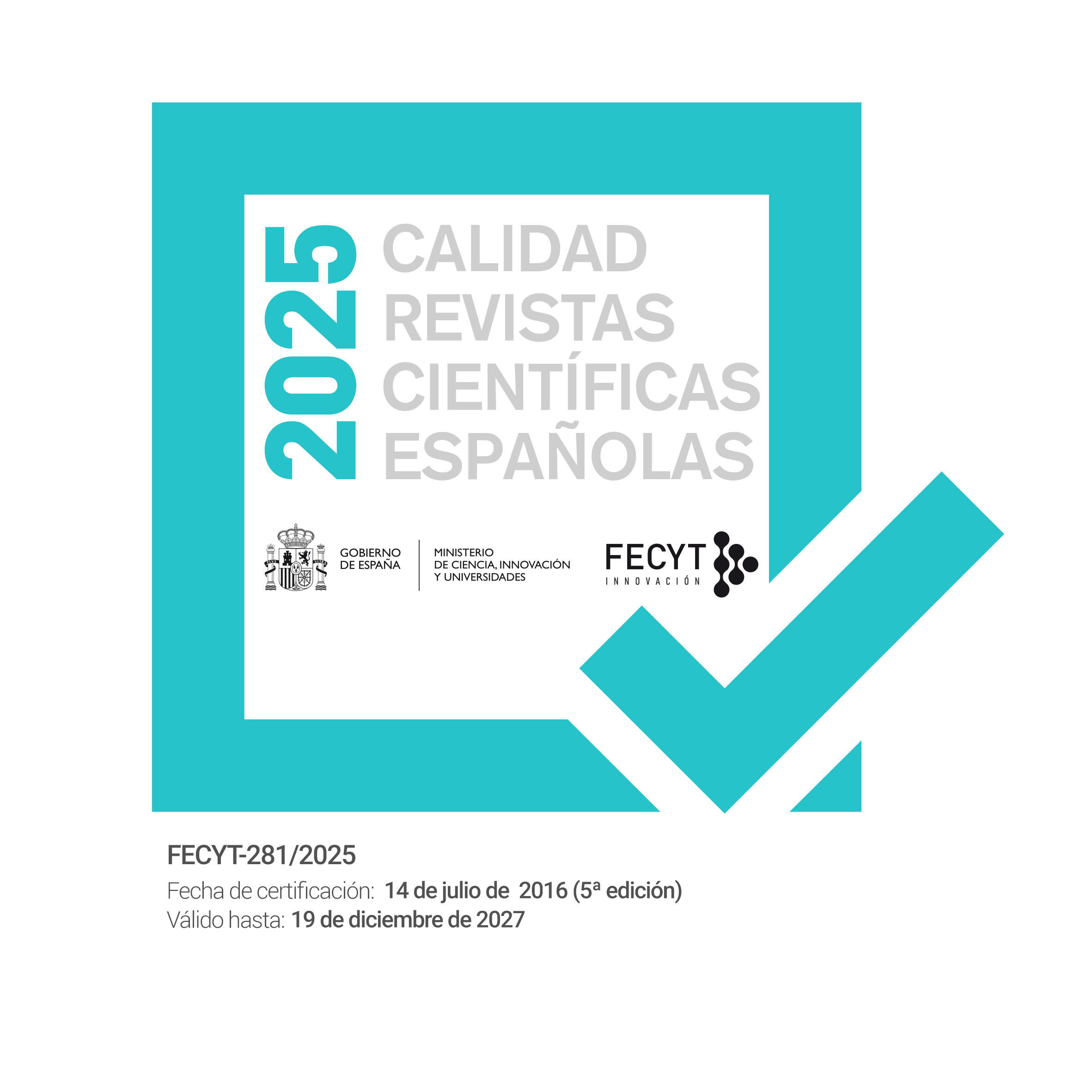ΙΗΣΩΝ ΥΠΟΤΡΟΠΟΣ (Apoll. Rhod., IV 1161 ss.)
Resumen
El episodio de Drepane se centra en el matrimonio entre Medea y Jasón y, como es sabido, presenta varias alusiones a su futuro dramático en Corinto. Jasón ὑπότροπος trae a la memoria distintos tópicos respecto a Odiseo; su regreso a Yolco es concebido de parte del poeta doctus como un componente de la ἀμηχανίη difusa en el poema de los Argonautas. Al contrario de Arete y Alcínoo, por un lado, y de Penélope y Odiseo, por el otro, Medea y Jasón son incapaces de establecer un οἶκος pacífico e ideal tras la conquista del vellocino de oro.
Descargas
-
Resumen867
-
PDF 484
Citas
B. Acosta-Hughes, 2007, Lyric Apollonius, in A. Martina e A. –T. Cozzoli (eds.), “L’epos argonautico”. Atti del Convegno. Roma, 13 maggio 2004, Roma, pp. 199-235.
D. Asheri – S. M. Medaglia – A. Fraschetti (eds.), 1990, “Erodoto. Le Storie. Libro III. La Persia”, Milano.
R. Beekes, 2010, “Etymological Dictionary of Greek”. With the Assistance of L. van Beek, I, Leiden – Boston.
Ch. R. Beye, 1982, “Epic and Romance in the Argonautica of Apollonius”, Carbondale and Edwardsville.
P. Briant, 1996, “Histoire de l’ empire Perse de Cyrus à Alexandre”, Paris.
C. S. Byre, 1997, Suspense in the Phaeacian Episode of Apollonius’ Argonautica, ICS 22, pp. 65-73.
C. S. Byre, 2002, “A Reading of Apollonius Rhodius’ Argonautica – The Poetics of Uncertainty” (Studies in Classics, 20), Lewiston – Queeenston – Lampeter.
M. Campbell, 1994, “A Commentary on Apollonius Rhodius Argonautica III 1-471” (Mnemosyne, Suppl. 141), Leiden – New York – Köln.
C. Catenacci, 2012, “Il tiranno e l’ eroe. Storia e mito nella Grecia antica”, Roma.
A. Cavarzere, 2003, Il ΠΟΛΥΤΡΟΠΟΣ Enea, in L. Belloni – L. de Finis – G. Moretti (eds.)
“L’ officina ellenistica. Poesia dotta e popolare in Grecia e a Roma, pp. 371-380, Trento (con lievi modifiche in Lexis, 20, 2002, pp. 71-86).
R. J. Clare, 2002, “The Path of the Argo. Language, Imagery and Narrative in the Argonautica of Apollonius Rhodius”, Cambridge.
J. J. Clauss, 1993, “The Best of the Argonauts. The Redifinition of Epic Hero in Book 1 of Apollonius’ s Argonautica”, Berkeley – Los Angeles – Oxford.
J. J. Clauss, 2000, Cosmos without Imperium: The Argonautic Journey through Time, in M. A. Harder – R. F. Regtuit – G. C. Wakker (eds.), Apollonius Rhodius (Hellenistica Groningana, 4), Leuven – Paris – Sterling, Virginia, pp. 11-32.
A. Debiasi, 2003, POxy LIII 3698: Eumeli Corinthii fragmentum novum?, ZPE 143, pp. 1-5.
A. Debiasi, 2020, “Eumelo, la saga argonautica e dintorni. La documentazione papirologica” (Hesperìa, 36), Roma – Bristol.
A. T. Drago, 2021. “Lieti obbedirono alla legge dell’ antico talamo”: episodi di memoria odissiaca in età ellenistica e tardoantica, in R. J. Gallé Cejudo – M. Sánchez Ortiz de Landaluce (eds.), “Studia Hellenistica Gaditana II. De Calímaco a Nono de Panópolis: Estudios de crítica textual y exégesis literaria”. Con la colaboración de S. Plaza Salguero, Lecce, pp. 199-208.
A. R. Dyck, 1989, On the Way from Colchis to Corinth: Medea in Book 4 of the ‘Argonautica’, Hermes 117, pp. 455-470.
H. Ebeling (ed.), 1880, “Lexicon Homericum”, II, Lipsiae.
B. Effe, 2001, The Similes of Apollonius Rhodius. Intertextuality and Epic Innovation, in Th. D. Papanghelis and A. Rengakos (eds.), “A Companion to Apollonios Rhodios”, Leiden – Boston – Köln, pp. 147-169.
M. R. Falivene, 2000, Un’ invincibile debolezza: Medea nelle «Argonautiche» di Apollonio Rodio, in B. Gentili e F. Perusino (eds.), “Medea nella letteratura e nell’ arte”, Venezia, pp. 109-116.
B. Gentili, 1972, Il letto «insaziato» di Medea e il tema dell’ ἀδικία a livello amoroso nei lirici (Saffo, Teognide) e nella Medea di Euripide, SCO 21, pp. 60-72.
B. Gentili, 2000, La «Medea» di Euripide, in “Medea nella letteratura e nell’ arte”, cit., pp. 29-41.
M. Fernández-Galiano – A. Heubeck – G. A. Privitera (eds.), 1986, “Omero. Odissea. Vol. VI (Libri XXI-XXIV)”, Milano.
H. Fränkel, 1968, “Noten zu den Argonautika des Apollonios”, München.
H. Friis Johansen and W. Whittle (eds.), 1980, “Aeschylus. The Suppliants”, III, Copenhagen.
J. B. Hainsworth – G. A Privitera (eds.), 1982, “Omero. Odissea. Vol. II (Libri V-VIII)”, Milano.
R. A. Hazzard, 2000, “Imagination of a Monarchy: Studies in Ptolemaic Propaganda” (Phoenix, Suppl. 37), Toronto – Buffalo – London.
A. Hoekstra – G. A Privitera (eds.), 1984, “Omero. Odissea. Vol. II (Libri V-VIII)”, Milano.
R. L. Hunter, 1987, Medea’ s Flight: The Fourth Book of the Argonautica, CQ 37, pp. 129-139 = 2008, “On Coming after. Part 1. Hellenistic Poetry and Its Reception”, Berlin – New York, pp. 42-58.
R. Hunter, 1988, ‘Short on Heroics’: Jason in the Argonautica, CQ 38, pp. 436-453 = “On Coming after”, cit., pp. 59-85.
R. L. Hunter (ed.), 1989, “Apollonius of Rhodes. Argonautica. Book III”, Cambridge.
R. Hunter, 1993, “The Argonautica of Apollonius. Literary Studies”, Cambridge.
R. Hunter, 2001, The Poetics of Narrative in the Argonautica, in “A Companion to Apollonius Rhodius”, cit., pp. 93-125.
R. Hunter (ed.), 2015, “Apollonius of Rhodes. Argonautica. Book IV”, Cambridge.
G. O. Hutchinson, 1988, “Hellenistic Poetry”, Oxford.
G. L. Huxley, 1969, “Greek Epic Poetry from Eumelos to Panyassis”, London.
H. R. Immerwahr, 1966, “Form and Thought in Herodotus”, Cleveland Ohio.
H. Kleinknecht, 1966, Herodot und die Makedonische Urgeschichte, Hermes 94, pp. 134-146.
V. Knight, 1995, “The Renewal of Epic. Responses to Homer in the Argonautica of Apollonius” (Mnemosyne, Suppl. 152), Leiden – Boston – Köln.
D. Lanza, 1977, “Il tiranno e il suo pubblico”, Torino.
G. Lawall, 1966, Apollonius’ Argonautica: Jason as Anti-Hero, YClS 19, pp. 121-169.
E. Livrea (ed.), 1973, “Apollonii Rhodii Argonauticon. Liber Quartus”, Firenze.
D. J. Mastronarde (ed.), 2002, “Euripides. Medea”, Cambridge.
R. Matteo, 2007, “Apollonio Rodio. Argonautiche. Libro II”, Lecce.
V. J. Matthews, 1996, “Antimachus of Colophon. Text and Commentary”, Leiden – New York – Köln.
C. Miralles – V. Citti – L. Lomiento (eds.), 2019, “Eschilo. Supplici” (BollClass, Suppl. 33), Roma.
A. Mori, 2008, “The Politics of Apollonius’ Rhodius Argonautica”, Cambridge.
St. A. Natzel, 1992, “Κλέα γυναικῶν. Frauen in den ‘Argonautika’ des Apollonios Rhodios” (BAC, 9), Trier.
J. Priestley, 2014, “Herodotus and the Hellenistic Culture. Literary Studies in the Reception of the Histories”, Oxford.
L. E. Rossi, 1968, La fine alessandrina dell’ Odissea e lo ζῆλος Ὁμηρικός di Apollonio Rodio, RFIC 96, pp. 151-163 = G. Colesanti e R. Nicolai (eds.), 2020, “κηληθμῷ δ᾿ ἔσχοντο. Scritti editi e inediti”. Volume 2: Letteratura, Berlin – Boston, pp. 673-684.
L. E. Rossi, 1995, Letteratura di filologi e filologia di letterati, in A. Porro – G. Milanese (eds.),“Poeti e filologi, filologi-poeti. Composizione e studio della poesia epica e lirica nel mondo greco e romano”. Atti del congresso. Brescia, Università Cattolica, 26-27 aprile 1995, Aevum(ant) 8, pp. 9-32 = “κηληθμῷ δ᾿ ἔσχοντο”, cit., pp. 746-766.
F. Stoessl, 1941, “Apollonios Rhodios. Interpretationen zur Erzählungskunst und Quellenverwendung”, Leipzig.
L. K. Taaffe, 1990, There’ s No Place like Home: Ἀσπάσιος and Related Words in the Odyssey, CJ 86, pp. 131-138.
G. Tarditi, 1957, Euripide e il dramma di Medea, RFIC 35, pp. 354-371 = L. Belloni – G. Milanese – A. Porro (eds.), 1988, “Studi di poesia greca e latina”, Milano.
G. Tedeschi, 2005, Medea e gli Argonauti nei poeti greci, in F. Crevatin e G. Tedeschi (eds.), “Scrivere leggere interpretare”. Studi di antichità in onore di Sergio Daris, Trieste, pp. 303-332.
K. Thiel, 1996, “Aietes der Krieger – Jason der Sieger. Zum Heldenbild im hellenistischen Epos” (Palingenesia 60), Stuttgart.
C. Vatin, 1970, “Recherches sur le mariage et la condition de la femme mariée à l’ époque ellénistique”, Paris.
F. Vian, 1978, ΙΗΣΩΝ ΑΜΗΧΑΝΕΩΝ, in E. Livrea e G. A. Privitera (eds.), “Studi in onore di Anthos Ardizzoni”, II, Roma, pp. 1025-1041.
F. Vian – É. Delage (eds.), 2011, “Apollonios de Rhodes. Argonautiques. Tome III. Chant IV”, Paris.
C. Wendel, 1935, “Scholia in Apollonium Rhodium vetera”, Berlin.
M. L. West, 1997, “The East Face of Helicon. West Asiatic Elements in Greek Poetry and Myth”, Oxford.
M. L. West, 2002, Eumelos: A Corinthian Epic Cycle?, JHS 122, pp. 109-133.
M. F. Williams, 1996, The Character of Aeëtes in the ‘Argonautica’ of Apollonius Rhodius, Hermes 124, pp. 463-479.
B. Wyss, 1936, “Antimachi Colophonii reliquiae”, Berolini.
G. Zanker, 1987, “Realism in Alexandrian Poetry”, London – Sydney – Wolfeboro NH.
Las obras que se publican en esta revista están sujetas a los siguientes términos:
1. El Servicio de Publicaciones de la Universidad de Murcia (la editorial) conserva los derechos patrimoniales (copyright) de las obras publicadas, y favorece y permite la reutilización de las mismas bajo la licencia de uso indicada en el punto 2.
2. Las obras se publican en la edición electrónica de la revista bajo una licencia Creative Commons Reconocimiento-NoComercial-SinObraDerivada 3.0 España (texto legal). Se pueden copiar, usar, difundir, transmitir y exponer públicamente, siempre que: i) se cite la autoría y la fuente original de su publicación (revista, editorial y URL de la obra); ii) no se usen para fines comerciales; iii) se mencione la existencia y especificaciones de esta licencia de uso.
3. Condiciones de auto-archivo. Se permite y se anima a los autores a difundir electrónicamente las versiones pre-print (versión antes de ser evaluada) y/o post-print (versión evaluada y aceptada para su publicación) de sus obras antes de su publicación, ya que favorece su circulación y difusión más temprana y con ello un posible aumento en su citación y alcance entre la comunidad académica. Color RoMEO: verde.






